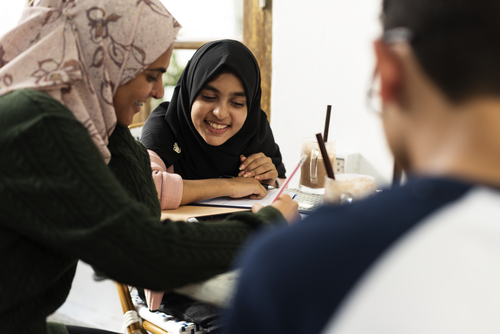Ramadan is a holy month where Muslims celebrate by fasting and getting closer to God. This year it’s coming along with schools and studying, which might be difficult for Muslim students.

The upcoming advice is for all teachers, whether Muslim or not, as you don’t have to a Muslim teacher to sympathize with your students and support them.
“How can I support my Muslim students during Ramadan?”
1- If you’re not Muslim, educate yourself more about Ramadan
Some websites and articles talk about Ramadan, which can be beneficial for you. You might also find Muslim neighbors that will be glad to provide you with more information about Ramadan.Search for the closest mosques in your area. They will be accommodating and welcoming if you ask them any questions.
Ask students to make presentations about Ramadan to help them get educated about it. That helps them feel more secured, accepted and gets you to learn a lot about Ramadan.
2- Be more flexible and tolerant with Muslim students
Muslim students mainly fast for the whole school day, which makes studying harder for them. Please try to provide them with facilities to help them concentrate and do better in the class.Propose to the management of the school to provide fans in the classrooms if there aren’t. Also, please don’t make them face a lot of heat or sun rays. It will make them feel thirsty.
Communicate with them and tell them that you understand that they’re probably tired and if they need anything, you’re going to be there.
3- Make your classroom a safe space for everyone to express themselves
Provide a safe space for all students from diverse backgrounds and assure them how accepting and tolerant you are.Not only Muslim students but apply this concept for everyone, especially for minorities and refugees if you have any.
Always talk about equality and human rights. School is not only about academic content; it’s also about teaching values and manners to all students.
Be a role model and never give space for bullying or making fun of anybody. Students imitate your actions and get affected by who you are and what you believe in.
4- Create classroom events and celebrations about Ramadan
Decorate the classroom with Islamic art decorations. Learn more about lanterns and what they mean in Islamic societies.You can give all students a small lantern as gifts and as an expression of love and support.
Google Ramadan decorations and suggest doing this activity with your students. They would love to spend time in handcrafts.
Spending such time helps students get closer to each other and makes their communication way smoother.
Additionally, you can ask students to bring the names of their favorite Ramadan songs and play them while decorating the classroom. That will get a lot of joy to their little hearts.
5- Create communication between all students from different backgrounds
Always create that communication space among your students by doing constant activities and getting them to talk proudly about their cultural backgrounds.Some students feel shy to mention who they are and where they are initially from because they face a lot of bullying.
Try to break these barriers between students who don’t know each other.
You can do that by proudly talking and constantly mentioning your cultural background. Let your students know that we all are different, and it’s beautiful to have your own unique culture.

6- Don’t involve them in physically exhausting activities
Muslim students are mostly tired because of fasting. Their blood pressure is also low during the whole day because of a lack of food and hydration.Involving them in physically exhausting activities might be dangerous for their health. It also might make them hate school and feel uncomfortable.
Find other alternatives for them. Be there and create different exciting activities that do not involve much effort.
7- Communicate with the students’ parents
Do a survey about the problems that students face in Ramadan and introduce it to their parents.Express your support and understanding. Moreover, tell the parents that you’re there whenever there’s an inquiry or a problem.
Sometimes parents wait for the first step from you to communicate and express their thoughts. You don’t know how much they will feel appreciated when you do that.
8- Give alternatives for lunchtime
If students are fasting, sitting in the same room, watching their friends eating is honestly a lot of torture.They may also feel left out and alienated. Provide the students other alternatives and other excellent activities to do during that time. Permit them to practice different activities other than eating.
Ask for their opinion and communicate with school management to provide you with the facilities for applying this idea.

9- Secure a prayer space for Muslim students
Muslims pray five times a day. In Ramadan, praying is essential for them, as it’s the month of getting closer to God.Make sure that there’s a clean and well-prepared space for students to pray. A lot of schools do not consider this.
Students feel like they cannot be appreciated or heard when they find out that they cannot practice prayers freely.
Not being able to pray may also affect your students’ concentration and mental health. Please pay attention to that point and don’t prevent them from taking a break from praying.
Eventually, Ramadan is supposed to bring people closer and refresh the spirituality of the Muslim students. Take the chance and make the best out of this time of the year.







 2023-03-08
2023-03-08
 2022-11-11
2022-11-11
 2022-11-10
2022-11-10
 2022-11-05
2022-11-05
 2022-11-03
2022-11-03